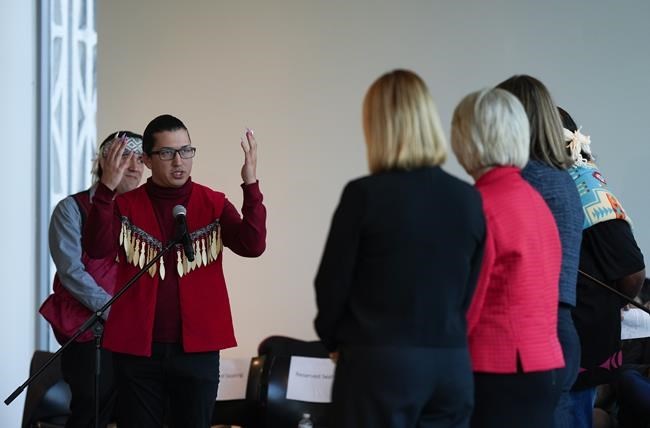VANCOUVER — In what's being called a first-of-its-kind strategy, three First Nations on whose territory Vancouver was built have come together with city officials to create a path for implementing the United Nations Declaration on the Rights of Indigenous Peoples.Â
Khelsilem, ߣÄÌÉçÇøNation council chairperson and co-chair of the UNDRIP task force, said Wednesday the city and the Musqueam, ߣÄÌÉçÇøand Tsleil-Waututh nations already work together in many areas,but the strategy aims to make shared decision-making standard practice in the city's work.
The process to develop the strategy involved thinking about what Indigenous rights mean in an urban context with a municipal government, Khelsilem said.
"Where we arrived to, very organically, was that the relationship needs to start between the City of Vancouver as a government and the three local First Nations governments, because the unceded territory and title and rights starts from there."
Those relationships provide the foundation from which the city also has obligations to urban Indigenous Peoples through the services it provides, Khelsilem said.
The joint task force, with representatives from the three nations alongside Vancouver city officials and staff, produced the strategy that contains 79 calls to action aimed implementing the UN declaration.
The report has been passed by councils of the three nations and it will be considered by city council on Oct. 25 with a recommendation that it be endorsed.
If it passes, Vancouver would become the first city in the world to implement the UN declaration with the strategy jointly developed alongside three First Nations, Khelsilem told a news conference.
The city would also join the B.C. and federal governments in taking action to implement the declaration.Â
The strategy's release on Wednesday was marked with a ceremony, with attendees including outgoing Mayor Kennedy Stewart; the national chief of the Assembly of First Nations, RoseAnne Archibald; and B.C. regional chief Terry Teegee.
Khelsilem told the gathering the process to implement the UN declaration came about because of a "genuine, mutual respect" between those involved, and a desire to create a meaningful pathway for reconciliation in the city.
The recommendations are sorted into themes: social, cultural and economic well-being; ending Indigenous-specific racism and discrimination; self-determination and inherent right of self-government; and rights and title of Indigenous Peoples.
Among the calls to action are prioritizing access to cultural sites for the nations' members and creating a policy to assess industrial development projects through the lens of Indigenous rights and environmental racism.
The report also recommends Vancouver police work with Indigenous Peoples to integrate the principles of the UN declaration, and relevant recommendations from the Truth and Reconciliation Commission and Inquiry into Missing and Murdered Indigenous Women and Girls.
The Vancouver Police Department has an Indigenous advisory committee and its board has indicated it would be open to having members from the three nations, Khelsilem said, noting the board members are appointed at the provincial level.
Speaking at a news conference, Tsleil-Waututh Nation councillor Dennis Thomas also highlighted calls to action around economic development and revenue sharing, noting the wealth created in Vancouver while Indigenous Peoples were oppressed.
"We've had a city built on our territory," said Khelsilem, pointing to articles in the declaration that relate to "redress, repatriation and compensation for lands lost."
The strategy will be considered during what will be one of the last meetings of the current city council after the municipal election earlier this month.
Coun. Christine Boyle, who co-chaired the task force, retained her seat, and said she's optimistic the strategy will pass unanimously and that the newly elected council will continue the city's work to implement the declaration.
This report by The Canadian Press was first published Oct. 19, 2022.
Brenna Owen, The Canadian Press




